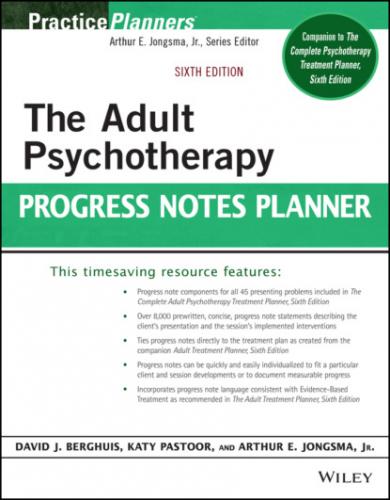Cover design: Wiley
To Dave and Jan Dykgraaf, who are models of compassion and sacrifice for the good of others.
Arthur E. Jongsma, Jr.
To my parents, David and Barb, who taught me everything I know in my career and life. Their love for each other and support of my dreams has inspired me to become the woman I am today.
Katy Pastoor
PRACTICEPLANNERS® SERIES PREFACE
Accountability is an important dimension of the practice of psychotherapy. Treatment programs, public agencies, clinics, and practitioners must justify and document their treatment plans to outside review entities in order to be reimbursed for services. The books in the PracticePlanners® series are designed to help practitioners fulfill these documentation requirements efficiently and professionally. They have also proven very beneficial to graduate students as well as young or seasoned practitioners who are looking for suggestions for effective Interventions, all of which are best practice or evidence-based.
The PracticePlanners® series includes a wide array of treatment planning books including not only the original Complete Adult Psychotherapy Treatment Planner, Child Psychotherapy Treatment Planner, Adolescent Psychotherapy Treatment Planner, and Addictions Treatment Planner all now being revised and updated for the 6th editions, in their sixth editions, but also many other Treatment Planners targeted to specialty areas of practice, including:
Co-occurring disorders
Integrated behavioral medicine
College students
Couples therapy
Crisis counseling
Early childhood education
Employee assistance
Family therapy
LGBTQ+
Group therapy
Juvenile justice and residential care
Intellectual and developmental disability
Neuro rehabilitation
Older adults
Parenting skills
Pastoral counseling
Personality disorders
Probation and parole
Psychopharmacology
School counseling and school social work
Severe and persistent mental illness
Sexual abuse victims and offenders
Social work and human services
Special education
Speech-language pathology
Suicide and homicide risk assessment
Veterans and active military duty
Women's issues
In addition, there are three branches of companion books that can be used in conjunction with the Treatment Planners, or on their own:
Progress Notes Planners provide a menu of progress statements that elaborate on the client's symptom presentation and the provider's therapeutic intervention. Each Progress Notes Planner statement is directly integrated with the behavioral definitions and therapeutic interventions from its companion Treatment Planner.
Homework Planners include homework assignments designed around each presenting problem (such as anxiety, depression, substance use, anger management, eating disorders, or panic disorder) that is the focus of a chapter in its corresponding Treatment Planner.
Client Education Handout Planners provide brochures and handouts to help educate and inform clients on presenting problems and mental health issues, as well as life skills techniques. The handouts are included on CD-ROMs for easy printing from your computer and are ideal for use in waiting rooms, at presentations, as newsletters, or as information for clients struggling with mental illness issues. The topics covered by these handouts correspond to the presenting problems in the Treatment Planners.
Adjunctive books, such as The Psychotherapy Documentation Primer and The Clinical Documentation Sourcebook, contain forms and resources to aid the clinician in mental health practice management.
The goal of our series is to provide practitioners with the resources they need in order to provide high-quality care in the era of accountability. To put it simply: We seek to help you spend more time on patients and less time on paperwork.
ARTHUR E. JONGSMA, JR.
Grand Rapids, Michigan
ACKNOWLEDGMENTS
For this 6th edition of the Adult Psychotherapy Progress Notes Planner we enjoy the benefits of a generational change in the contributing author of updated material. Our previous contributing author of updated content, David Berghuis, has mentored his daughter, Katy Pastoor, a master's level psychologist, to provide the revised content. Thank you, Katy, for your excellent work following in the footsteps of your very capable father. She has created new content where needed based on the updates made to the companion 6th edition of The Adult Psychotherapy Treatment Planner.
A.E.J.
PROGRESS NOTES INTRODUCTION
ABOUT PRACTICEPLANNERS® PROGRESS NOTES
Progress notes are not only the primary source for documenting the therapeutic process, but also one of the main factors in determining the client's eligibility for reimbursable treatment. The purpose of the Progress Notes Planner series is to assist the practitioner in easily and quickly constructing progress notes that are thoroughly unified with the client's treatment plan.
Each Progress Notes Planner:
Saves you hours of time-consuming paperwork.
Offers the freedom to develop customized progress notes.
Features over 1,000 prewritten progress notes summarizing patient presentation and treatment delivered.
Provides an array of treatment approaches that correspond with the behavioral problems and DSM-IV and DSM-5 diagnostic categories in the corresponding companion Treatment Planner.
Offers sample progress notes that conform to the requirements of most third-party payors and accrediting agencies, including JCAHO, COA, CARF, and NCQA.
HOW TO USE THIS PROGRESS NOTES PLANNER
This Progress Notes Planner provides a menu of sentences that can be selected for constructing progress notes based on the behavioral definitions (or client's symptom presentation) and therapeutic interventions from its companion Treatment Planner. All progress notes must be tied to the patient's treatment plan—session notes should elaborate on the problems, symptoms, and interventions contained in the plan.
Each chapter title is a reflection of the client's potential presenting problem. The first section of the chapter, “Client Presentation,” provides a detailed menu of statements that may describe how that presenting problem manifested itself in behavioral signs and symptoms. The numbers in parentheses within the Client Presentation
